Global e-commerce: +$2 trillion in revenue in 2019
26/12/19
4'
The Ecommerce Foundation has published the 2019 edition of its annual u003ca href=u0022https://www.ecommercefoundation.org/free-reportsu0022 target=u0022_blanku0022 rel=u0022noopeneru0022u003eGlobal Ecommerce Reportu003c/au003e. According to the report, global B2C e-commerce sales are expected to total more than 2 trillion US dollars in 2019. Read on for a breakdown of the report’s most important findings, with a focus on the e-commerce markets in Europe, China and the US.
An overview
One of the most important prerequisites for e-commerce is, of course, a functioning internet connection. Europe is very well positioned in this respect with the highest internet penetration rate (85%) in 2019. Internet penetration rates are also good in North America (84%) and the Middle East (78%). Asia/Oceania, on the other hand, came in last with just 53% internet penetration, meaning u003cstrongu003ethere will be many growth opportunities in this zone in coming yearsu003c/strongu003e.
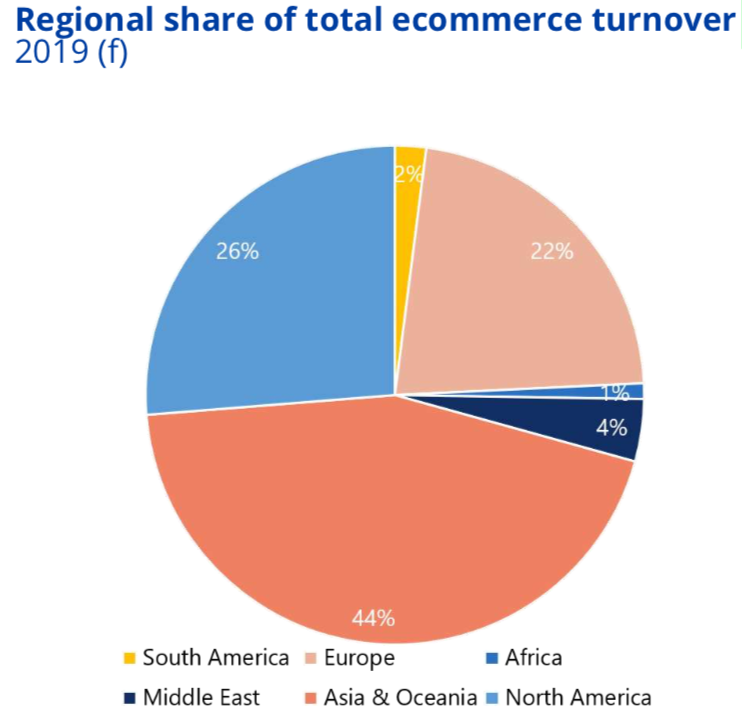
u003cstrongu003eB2C e-commerce revenues are expected to rise to over 2 trillion USD in 2019u003c/strongu003e. It is interesting to see how this revenue is distributed across the various regions of the world. It is astonishing that u003cstrongu003eAsia/Oceania leads the list here with 44% of global sales generated in the regionu003c/strongu003e. This is of, course, thanks to the driving force China. The two following largest e-commerce regions are North America (26%) and Europe (22%).
A focus on Europe
According to the Ecommerce Foundation report,u003cstrongu003e 72% of Europeans shop onlineu003c/strongu003e. The United Kingdom counts the most online shoppers at 87%. Germany (83%) and France (76%) are close behind. Italy, on the other hand, is far behind with 48% of its population shopping online. European shoppers spent an average of 1,715 USD online in 2019.
u003cstrongu003eThe growth in mobile shopping in Europe is also interesting to see, with a split in the direction of 50% mobile and 50% desktop.u003c/strongu003e In almost all major European countries, more than 40% of online shoppers also make purchases via mobile devices. With a 49% share, Spain is particularly in line with this trend. Retailers and brands must therefore ensure their content is also adapted to mobile devices such as smartphones or tablets. Nothing is more annoying for e-shoppers than incorrectly displayed shopping pages. Today, mobile is at least as important as the desktop in Europe.
E-Commerce in China 2019
In 2019, China has an average internet penetration rate of 61% of its enormous 1.44 billion people. 59% of the Chinau2019s u2018internet populationu2019 shop online. u003cstrongu003eB2C e-commerce sales in China are expected to reach 723 billion USD in 2019u003c/strongu003e.
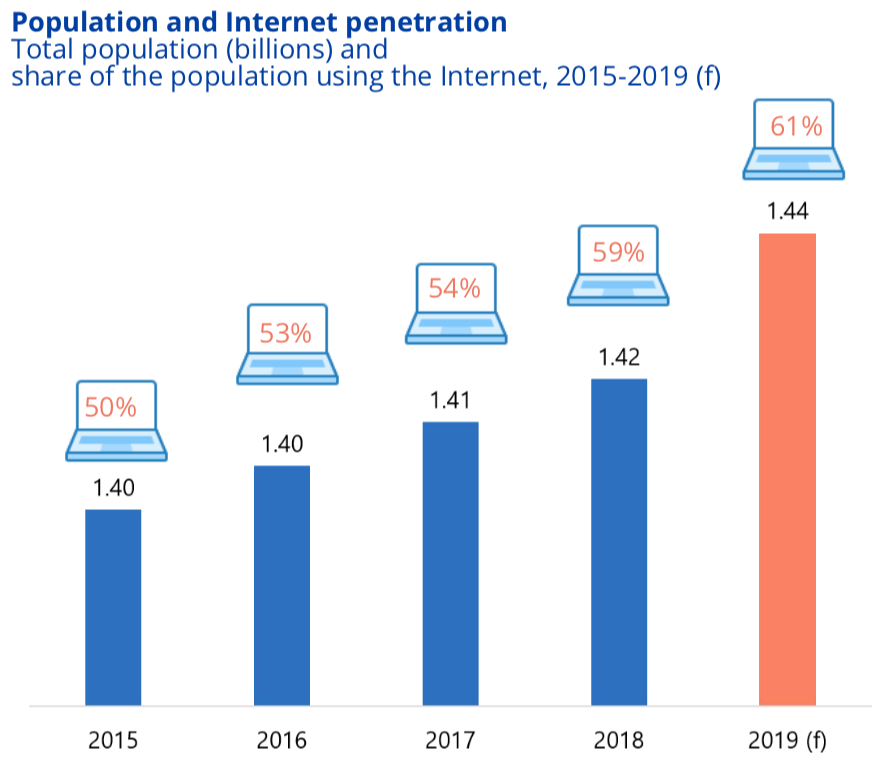
The increase in new e-shoppers in China is enormous u2013 increasing from 27.59 million in 2008 to over 76 million in 2018. Most of these new shoppers make purchases via mobile devices. China, for example, is far ahead of Europe in this area: u003cstrongu003e65% of internet users use smartphones or tablets when shopping. Only 36% still shop via desktop…u003c/strongu003e
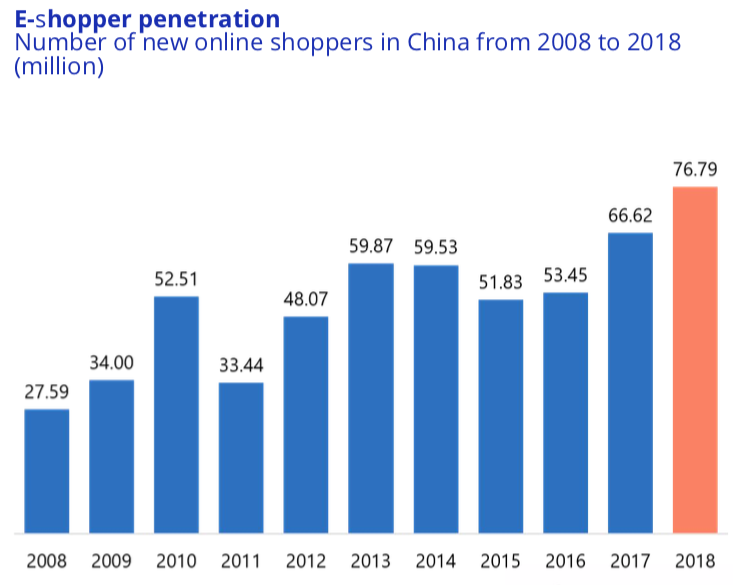
Chinau2019s most visited e-commerce site is u003ca href=u0022https://world.taobao.comu0022 target=u0022_blanku0022 rel=u0022noopeneru0022u003eTaobaou003c/au003e. Taobao belongs to the Alibaba Group, which u003cstrongu003econtrols 53.3% of the marketu003c/strongu003e. The second strongest force is JD.com with 16% of the market share.
E-Commerce in the USA 2019
In 2019, the US counts an impressive 90% internet penetration rate among its 329.44 million inhabitants. B2C e-commerce revenues are expected to grow to $547 billion in 2019. More than 82% of Americans are e-shoppers. In 2019, 44.7% of these shoppers also ordered products online via smartphones. u003cstrongu003eThis figure is expected to rise to almost 54% by 2024, making it more important than the desktop.u003c/strongu003e
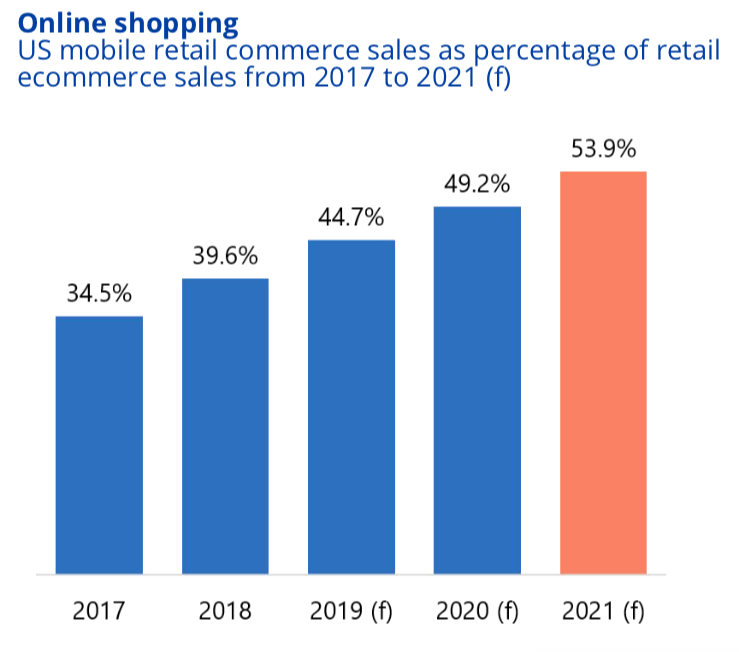
Very specific to the US is u003ca href=u0022https://blog.lengow.com/sell-on-amazon/u0022 target=u0022_blanku0022 rel=u0022noopeneru0022u003eAmazonu003c/au003e. The marketplace dominates the e-commerce market and leads in most categories, including electronics, handbags and accessories. To illustrate the dominant position, u003cstrongu003e80.1% of Americans surveyed in 2018 stated that when they search online for gifts, they begin with Amazonu003c/strongu003e; Walmart follows in second place with 56.7%.rnrnThe following chart shows the numbers of the largest US online retailers in early 2019, Amazon is far ahead of its competition:
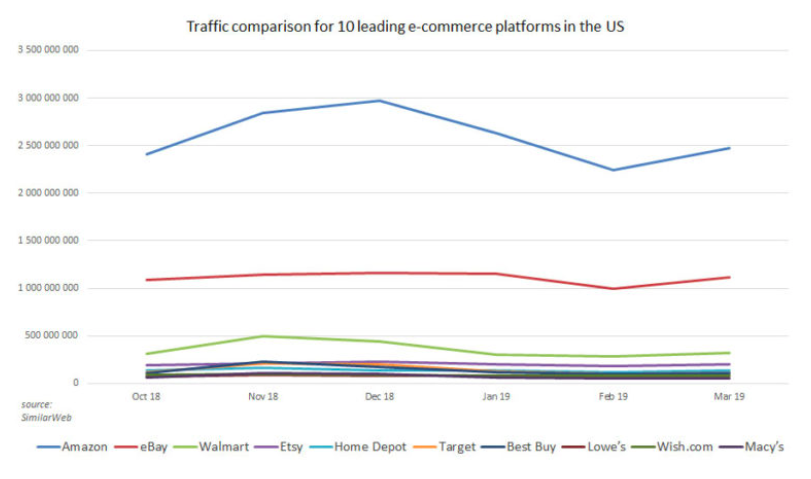
Images: Ecommerce Foundation, u003ca href=u0022https://pixabay.com/de/illustrations/netzwerk-erde-blockchain-globus-3537401/u0022 target=u0022_blanku0022 rel=u0022noopeneru0022u003ePixabay (geralt)u003c/au003ernrnSources: u003ca href=u0022https://blog.lengow.com/optimize-your-product-catalogue-with-lengow/u0022 target=u0022_blanku0022 rel=u0022noopeneru0022u003eEcommerce Report: Global 2019,u00a0Ecommerce Report: China 2019,u00a0Ecommerce Report: USA 2019u003c/au003e, u003ca href=u0022https://disfold.com/top-e-commerce-sites-us/u0022 target=u0022_blanku0022 rel=u0022noopeneru0022u003eDisfoldu003c/au003ernu003cp class=u0022card-mbu0022u003eu003c/pu003e
Your e-commerce library
E-commerce for Retailers
Learn moreE-commerce for Brands
Learn moreL'Oréal Luxe Success Story
Learn moreSign up for our newsletter
By submitting this form you authorize Lengow to process your data for the purpose of sending you Lengow newsletters . You have the right to access, rectify and delete this data, to oppose its processing, to limit its use, to render it portable and to define the guidelines relating to its fate in the event of death. You can exercise these rights at any time by writing to dpo@lengow.com

Trending Posts
Marketing channels
Where does Gen Z shop online?
Gen Z online shopping is transforming the digital marketplace, setting trends that redefine what it means to engage with brands…
16/04/24
9'
Marketplaces
The Top 10 Marketplaces in Europe
The e-commerce scene is a vibrant mix of marketplaces in Europe. These aren't just websites; they're bustling hubs where millions…
08/12/23
7'
Marketplaces
Lengow Now Fully Supports Zalando Logistics Solutions ZSS and ZRS
Zalando, one of Europe’s leading fashion marketplaces, continues to raise the bar with its advanced logistics and fulfillment programs. After…
12/12/24
4'
Marketplaces
How to win the Buy Box on Marketplaces (Amazon, Zalando, etc.)
What is the most important thing for marketplace sellers? Exactly, the Buy Box! If you don't have the Buy Box…
02/04/24
10'
Marketplaces
How to Sell on Temu? Best Tips
Emerging under the vast umbrella of PDD Holdings Inc., Temu has skyrocketed in popularity as a shopping sensation from China…
17/08/23
5'





